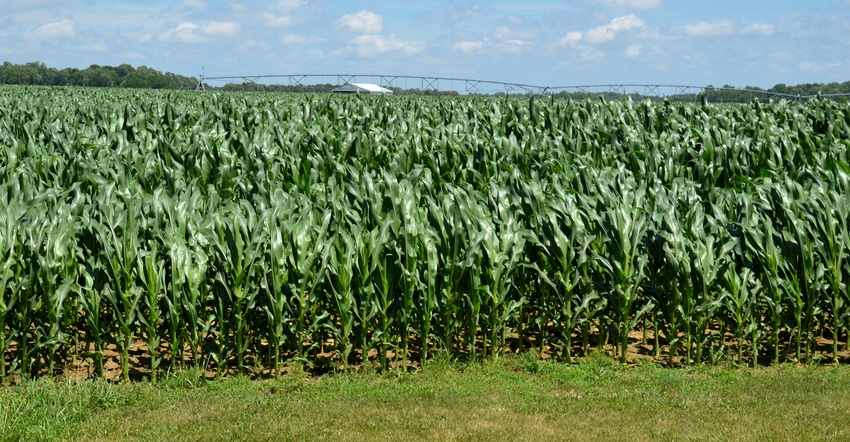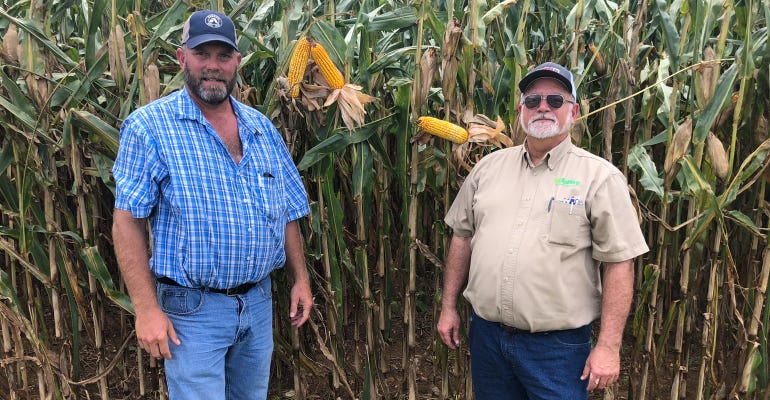
Maryland farmer Drew Haines isn’t used to being on the sidelines during harvest.
An emergency surgery to correct an aortic aneurysm meant that he couldn’t harvest his National Corn Yield Contest test plot on his Middletown farm, something he takes a lot of pride in.
Luckily, his brother and son stepped up for him.
What he didn’t expect, though, was a 366.28-bushel-per-acre yield.
“I couldn’t hardly believe it,” says Haines, who is still slowly recovering from heart surgery.
The yield garnered him first place nationally in the contest’s no-till/strip-till non-irrigated category, the first time he’s ever won first place nationally. In 2016, he placed second nationally in the non-irrigated category with a 324.93 bushel-per-acre yield.
Haines’ seed was DeKalb DKC60-88RIB. He’s tested the seed before on his farm to see how it would perform. But he credits other changes he’s made other the past year for his high-performing test plot.
He top-dressed the test plot twice with nitrogen and potash. He also applied his “dillweed juice,” a mixture of various nutrients and humic and fulvic acids, three times instead of two, and doubled his fungicide applications.
“Potash is key as far as keeping it standing, especially planting at 40,000 kernels population,” Haines says.
His farm averaged 250 bushels per acre, something he’ll take after a season of torrential downpours where he had to constantly replenish nitrogen.
 NATIONAL WINNER: Drew Haines (left) and his agronomist Grant Troop have worked closely to achieve high yields. His no-till non-irrigated plot was highest in the nation at 366.28 bushels.
NATIONAL WINNER: Drew Haines (left) and his agronomist Grant Troop have worked closely to achieve high yields. His no-till non-irrigated plot was highest in the nation at 366.28 bushels.

Some fields did better than others, including one field that got a 324-bushel yield with a shorter-season variety. Haines says the kernels set during an unusually dry period over summer. Another dry period later in summer helped the grain set.
But another field was damaged so badly by a midsummer storm that 50% of the stalks were broken.
Crop yields fall
Overall, corn and soybean yields were down in most Mid-Atlantic and Northeast states this year. Three of the five biggest corn and soybean producing states in the region — Delaware, Maryland, New Jersey, New York and Pennsylvania — saw average corn and soybean yields drop except for New York, which saw higher corn and soybean yields but dryer conditions. This is according to the November Northeastern Region Crop Production Report by the USDA’s National Agricultural Statistics Service.
Pennsylvania saw a slight increase in average soybean yields.
Corn production was down in every state except for New York, while soybean production was down in every state except for New York and Pennsylvania.
No 500-bushel plots
The contest saw no 500-bushel plots this year, the first time that’s happened since at least 2015. Notable names such as David Hula of Charles City, Va., who won the 2017 contest with a whopping 542.27-bushel yield, and Randy Dowdy of Valdosta, Ga., who got a 521.39-bushel yield in 2016, didn’t even make this year’s national list.
The top overall yield belonged to Dan Stall of Charlotte, Mich., with a yield of 477.68 bushels, the only plot to surpass 400 bushels. By comparison, the 2017 contest saw two plots with more than 400 bushels and three plots with more than 500 bushels. In 2016, three plots eclipsed 400 bushels and two plots eclipsed 500 bushels.
State winners
Non-irrigated:
• Connecticut — Harris Cohen of Ellington using DeKalb DKC64-34RIB: 252.0673
• Delaware — Jonathan Snow of Smyrna using Pioneer P1197YHR: 259.8486
• Maine — Ryan Crane of Exeter using Channel 185-15VT2PRIB: 278.1142
• Massachusetts — Brian Llewelyn of Northfield using Pioneer P9840AMXT: 303.2396
• New Hampshire — William Llewelyn of Northfield using Channel 199-29STXRIB: 213.2948
• New Jersey — Sam Santini of Stewartsville using Hubner Seeds H6755RCSS: 281.8136
• New York — Henry Everman of Dansville using DeKalb DKC63-60RIB: 273.0603
• Pennsylvania — Danielle Powell of Greenville using Pioneer P0339AM: 269.3224
• Vermont — Theodore Grembowicz of North Clarendon using DeKalb DKC45-66RIB: 203.9278
• West Virginia — Lynn Widmyer of Charles Town using Pioneer P1197AM: 229.0435
No-till, strip-till non-irrigated:
• Connecticut — Sanford Cohen of Ellington using DeKalb DKC64-34RIB: 249.1838
• Delaware — Whitney Snow of Smyrna using Pioneer P1197AM: 225.1555
• Massachusetts — Wanda Llewelyn of Northfield using Pioneer P9998AM: 292.4181
• Maryland — Drew Haines of Middletown using DeKalb DKC60-88RIB: 366.2872
• Maine — Alexander Hilton of Norridgewock using Channel 192-08VT2PRIB: 195.4838
• New Hampshire — Mary E. Llewelyn of Northfield using Pioneer P9998AM: 251.3333
• New Jersey — Pat Giberson of Pemberton using DeKalb DKC64-34RIB: 296.2000
• New York — Andrew McIlroy of Pavilion using DeKalb DKC56-03RIB: 261.3775
• Pennsylvania — Darren Grumbine of Lebanon using DeKalb using DKC62-53RIB: 291.7258
• Vermont — Jeffrey Grembowicz of West Rutland using DeKalb DKC45-66RIB: 225.4879
• West Virgina — Ronald Widmyer of Charles Town using Pioneer P1197AM: 218.1271
No-till, strip-till irrigated:
• Delaware — Gary Ockels of Milton using DeKalb DKC62-53RIB: 286.7530
• Maryland — Michael Bostic of Church Hill using Pioneer P1197AM: 287.9164
• Maine — Jon McCrum of Bethel using Channel 192-08VT2PRIB: 223.9988
• New Hampshire — Dan Llewelyn of Northfield using Pioneer P9840AMXT: 258.5996
• New Jersey — Jeffrey Barlieb of Stewartsville using Pioneer P1197AMXT: 269.7013
• Pennsylvania — Karl Dirks of Elizabethtown using DeKalb DKC67-44RIB: 280.8259
• West Virginia — Todd Widmyer of Charles Town using Pioneer P1197AM: 224.7398
Irrigated:
• Delaware — Steve Yingling of Bridgeville using DeKalb DKC62-53RIB: 290.4390
• Massachusetts — William Llewelyn of Northfield using Pioneer P9840AMXT: 310.4158
• Maryland — Marion Wilson of Centreville using DeKalb DKC67-44RIB: 292.0208
• Maine — Jon McCrum of Bethel using Channel 192-08VT2PRIB: 247.8271
• New Hampshire — Frederick Llewelyn of Northfield using Channel 203-44STXRIB: 256.4360
• New Jersey — Garrett Woolf of Monroe Township using Pioneer P1442AM: 262.1905
• New York — Paul Campbell of Nichols using Axis 56h56: 234.2452
• Pennsylvania — Clifford Charles of Lancaster using Pioneer P1197AM: 287.0355
• Vermont — Caroline Pinto of West Rutland using DeKalb DKC45-66RIB: 200.8360
• West Virginia — Ann Widmyer of Charles Town using Pioneer P1870AM: 234.6829
About the Author(s)
You May Also Like






